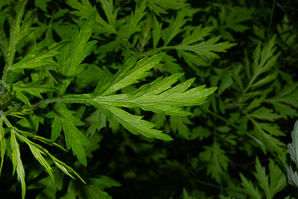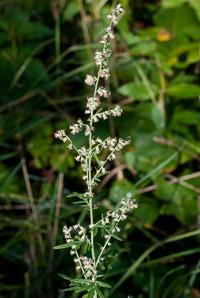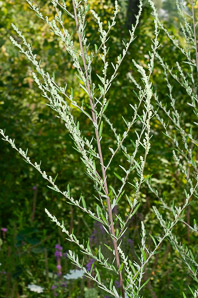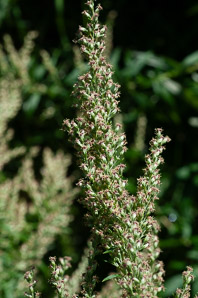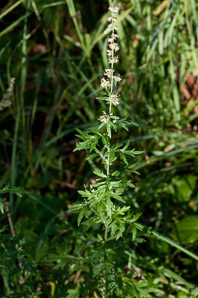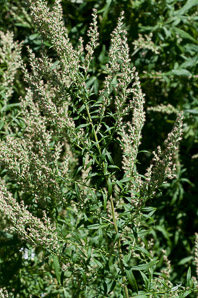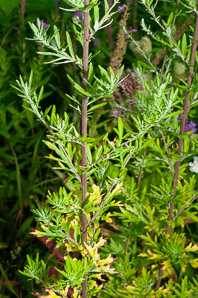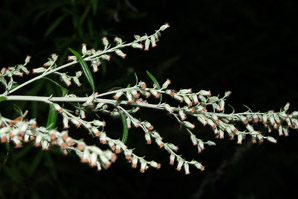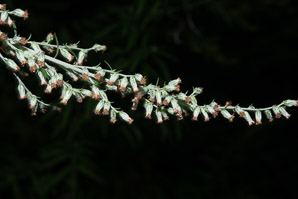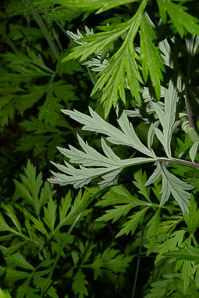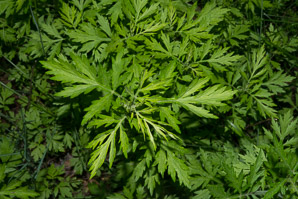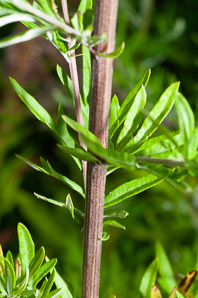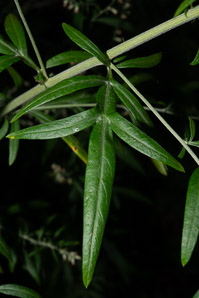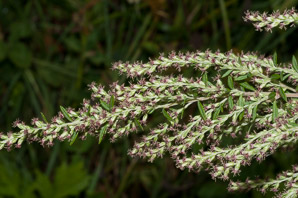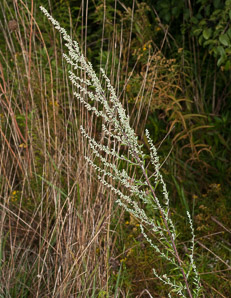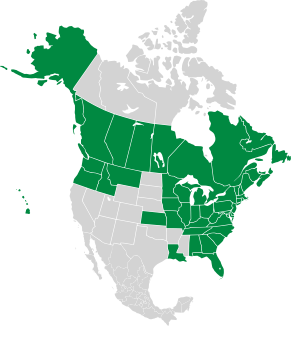Artemisia vulgaris L.
Wormwood, mugwort, common mugwort, common wormwood
Kingdom Plantae Plants, but not fungi, lichens, or algae
Subkingdom Tracheobionta Vascular plants—plants with a “circulatory system” for delivering water and nutrients
Division Magnoliophyta Flowering plants, also known as angiosperms
Class Magnoliopsida Dicotyledons—plants with two initial seed leaves
Subclass Asteridae A large class that encompasses asters
Order Asterales Flowering plants with a central disk flower and surrounding petals, like daisies
Family Asteraceae The aster family, which also includes daisies and sunflowers; from the Greek ἀστήρ, “star,” for the star-shaped flowers
Genus Artemisia From the Greek goddess Artemis, who gave it her own name because it helped cure her (there are other possible reasons for the derivation of this name too)
Species vulgaris “Common”
About plant names...
Common wormwood is a North American native. Don't confuse it with the
related species, Artemisia absinthium (from which
absinthe is made)—it is also called wormwood. In Russia and the Ukraine, a common name
for wormwood (полынь) is “chernobyl.” Like the town, whose name dates back to the 12th
century, the origin of the name is not known.
Identification: Plants are 1½-5′ (50-150 cm) tall,
on stiff stems that branch only a little. Stems are ridged, green or often purple, and nearly hairless,
although tiny white hairs
make the stem appear more pink than purple. Leaves are green above, but feltlike below,
covered with tiny white hairs, 1¾-8″ (5-20 cm) × 1-1¾″ (3-5 cm). The leaves are
deeply divided. Although numerous, flowers are small, inconspicuous, and yellow or dark red; they appear from
July to September.
References:
Agricultural Research Service of the United States Department of Agriculture, Common Weeds of the United States , Dover Publications, Inc., 1971 , p. 374
Uva, Richard H.; Neal, Joseph C.; DiTomaso, Joseph M., Weeds of the Northeast , Comstock Publishing Associates, 1997 , p. 116
Online References:
Plants for a Future, a resource and information centre for edible and otherwise useful plants
Wikipedia
The Virginia Tech Weed Identification Guide
SEINet—the Southwest Environmental Information Network
Botanical.com
6/5/2013 · Nashua River Rail Trail, Groton Center, Groton, Massachusetts · ≈ 8 × 6″ (20 × 14 cm)
9/3/2009 · Nashua River Rail Trail, Ayer, Massachusetts · ≈ 7 × 11″ (18 × 27 cm)
8/11/2010 · Nashua River Rail Trail, Groton Center, Groton, Massachusetts · ≈ 12 × 17″ (29 × 44 cm)
9/11/2010 · Nashua River Rail Trail, Groton Center, Groton, Massachusetts · ≈ 7 × 4½″ (17 × 11 cm)
9/3/2009 · Nashua River Rail Trail, Ayer, Massachusetts · ≈ 9 × 14″ (23 × 35 cm)
9/11/2010 · Nashua River Rail Trail, Groton Center, Groton, Massachusetts · ≈ 14 × 9″ (35 × 23 cm)
Older scientific or horticultural names
Artemisia selengensis Turcz. ex Besser
Artemisia tilesii Ledeb. var. aleutica (Hultén) S.L. Welsh
Artemisia unalaskensis Rydb.
Artemisia unalaskensis Rydb. var. aleutica Hultén
Artemisia vulgaris L. var. coarctata Forselles ex Besser
Artemisia vulgaris L. var. glabra Ledeb.
Artemisia vulgaris L. var. kamtschatica Besser
Artemisia vulgaris L. var. latiloba Ledeb.
Artemisia vulgaris L. var. selengensis (Turcz. ex Besser) Maxim.
Artemisia vulgaris L. var. vulgaris
Artemisia vulgaris description by Thomas H. Kent, last updated 1 Sep 2021.
© FloraFinder.org. All rights reserved.
8/11/2010 · Nashua River Rail Trail, Groton Center, Groton, Massachusetts · ≈ 9 × 14″ (23 × 35 cm)
9/4/2013 · Amos Kendall Conservation Area, Dunstable, Massachusetts · ≈ 8 × 5″ (19 × 12 cm)
9/4/2013 · Amos Kendall Conservation Area, Dunstable, Massachusetts · ≈ 6 × 4″ (16 × 10 cm)
6/5/2013 · Nashua River Rail Trail, Groton Center, Groton, Massachusetts · ≈ 6 × 9″ (16 × 23 cm)
6/5/2013 · Nashua River Rail Trail, Groton Center, Groton, Massachusetts · ≈ 15 × 10″ (37 × 25 cm)
8/11/2010 · Nashua River Rail Trail, Groton Center, Groton, Massachusetts · ≈ 3½ × 5″ (9.2 × 13 cm)
9/4/2013 · Amos Kendall Conservation Area, Dunstable, Massachusetts · ≈ 4½ × 7″ (11 × 16 cm)
9/18/2010 · Nashua River Rail Trail, Groton Center, Groton, Massachusetts · ≈ 7 × 4½″ (17 × 11 cm)
9/14/2009 · Near Nashoba Hospital, Ayer, Massachusetts · ≈ 1 × 2′ (41 × 62 cm)
Range:
About this map...

